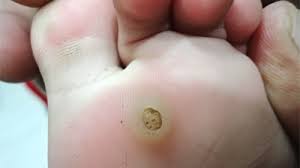
Plantar warts (Verrucae Plantaris) are one of the most common viral infections of the skin. They are caused by the Human Papilloma Virus (HPV), of which there are over 100 strains, some of which cause warts on the hands and other areas.
The virus survives in warm, moist environments and is believed to be transported via water molecules and transmitted to others through tiny cuts and breaks in the skins surface. Walking barefoot in public amenities, locker rooms and swimming in public swimming pools are among the more common explanations for people coming in contact with the virus.
They are often painful and feel like a rock under the foot when walking. Their appearance can be unpleasant, with a cauliflowered appearance and tiny pigmentations throughout. The full extent of a plantar wart extends deep below the skins outer layer and this is why these lesions are more difficult to treat than a wart that appears on the hand.
Plantar warts are often mistaken for corns and callouses and so it is very important to have the correct distinction made in your consultation.
Suncoast Podiatry has a very specific treatment protocol for warts which can include:
Application of a Blistering Agent using a topical mixture of cantharidin, podophyllotoxin and salicylic acid
Chemical Cauterisation using high strength acids such as Salicylic Acid or Nitric Acid
Prescription Medications: For those who have many warts, surgery will not work due to the large surface area that will need to be treated.In these cases, your doctor may prescribe medications such as high doses of Vitamin A or Cimetidine.
Boosting the Immune System: Since warts are a virus it may be recommended to boost the immune system and leaving them to heal spontaneously. However since they are painful and may spread, it is often recommended to keep a close eye on them and seek help if they become unmanageable.
Over the counter medications: There are many wart remedies on the market, most of which aren’t strong enough to be of great benefit. They may, however, be advised in conjunction with your treatment at Suncoast Podiatry.
Leave them be: If your wart is not spreading or causing any harm then you may choose not to undergo treatment. However, if your wart is painful to walk on or you notice that it is spreading, a consultation is advisable. Your podiatrist will be able to assist you with simple ways to make life more comfortable such as incorporating padding onto your shoe insole to offload the area and help you walk pain free.
